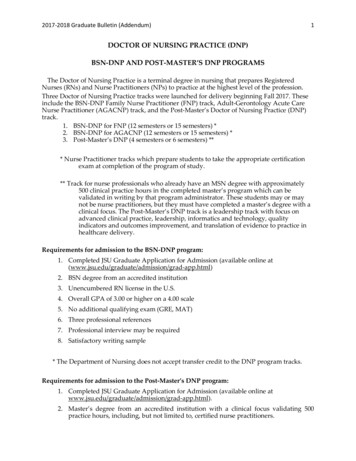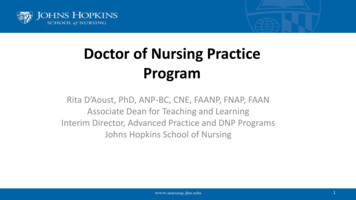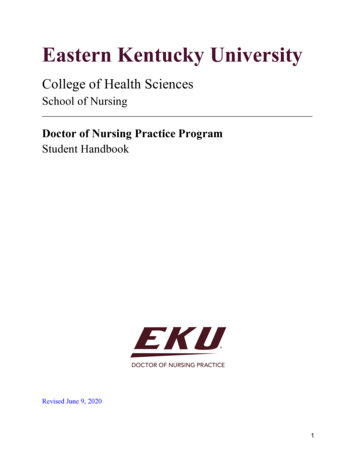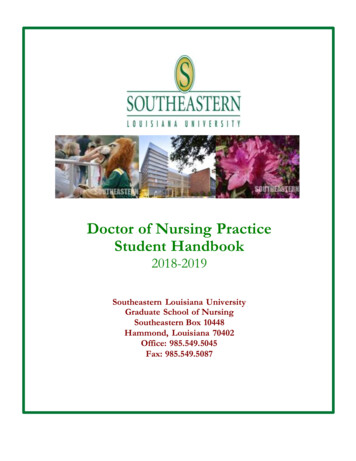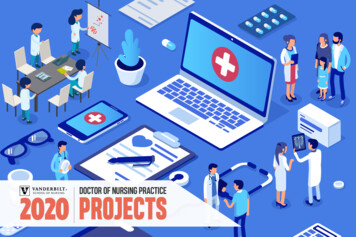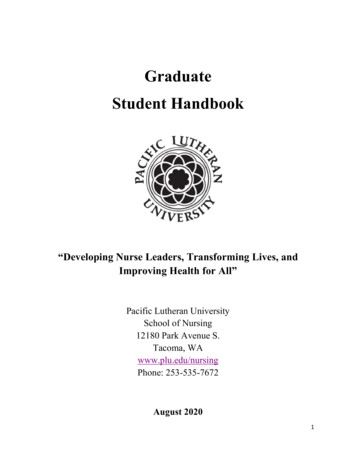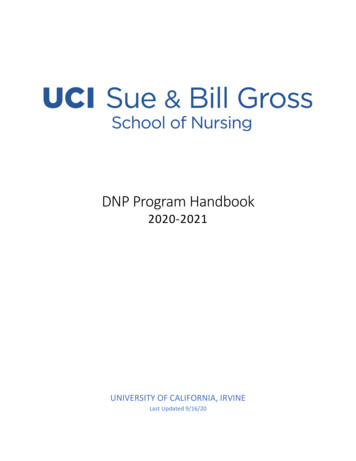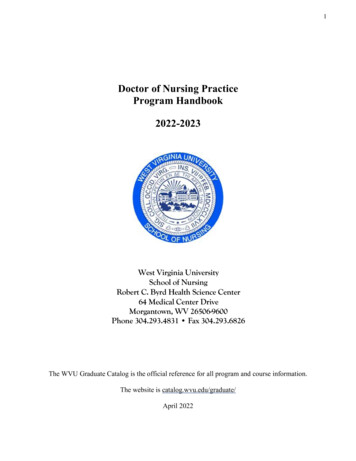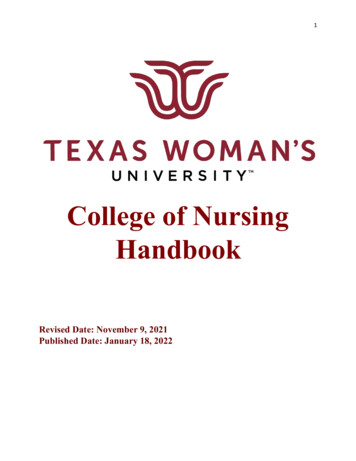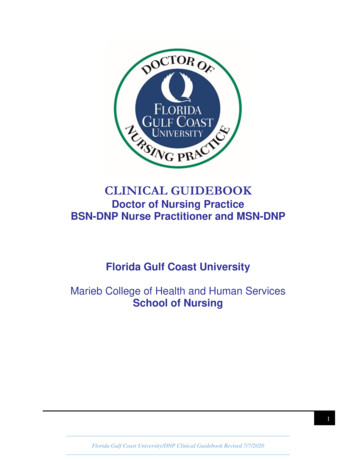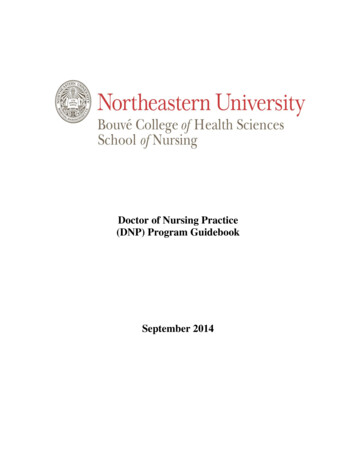
Transcription
Doctor of Nursing Practice(DNP) Program GuidebookSeptember 2014
updated September 30, 2014Doctor of Nursing Practice (DNP) Program GuidebookWelcome to the Northeastern University School of Nursing Doctor of Nursing Practice (DNP)program. You are beginning an exciting phase of your nursing career. This Guidebook wasdeveloped to provide you with specific information about the DNP program. It is to be used inconjunction with the School of Nursing Graduate Program Student Handbook, which can beaccessed at 2015%20SON%20Graduate%20Handbook.8-28-2014.pdf, and the Bouvé College of HealthScience’s Graduate Policies and Regulations, f/bouve grad handbook 2014 15.pdf. ThisGuidebook complements the information, policies, procedures and regulations outlined in theother two documents. As additions are made to the Guidebook, they will be shared with you viathe DNP Blackboard site. Students are accountable for the information available in all threedocuments.Although many professional nursing standards and guidelines are used to some degree in thedevelopment and refinement of all SON programs, the major documents used consistently byfaculty to guide the initial DNP curriculum development, evaluation, and revision are as follows: American Association of Colleges of Nursing. (2006). Essentials of Doctoral Educationfor Advanced Nursing Practice National Organization of Nurse Practitioner Faculty (2013). DNP Toolkit: Process andApproach to DNP Competency Based EvaluationIn addition, faculty has used the following major reports to guide further curriculum revisions inrelation to the specific aspects such as interprofessional practice, evidence-based practice (EBP),quality care, and cultural and linguistic competence, and threads that are currently the pillars onwhich all nursing curricula are based (SON 2012). Interprofessional Education Collaborative Expert Panel (2011). Core competenciesfor interprofessional collaborative practice: Report of an expert panel. Washington,D.C. Institute of Medicine (2001). Crossing the quality chasm. Washington, DC:National Academies Press. ) Institute of Medicine. (2003). Health professions education: A bridge to quality.Washington, DC: National Academies Press. ucation-A-Bridge-to-Quality.aspx) Institute of Medicine. (2010). The future of nursing. Leading change, advancinghealth. Washington, DC: National Academies Press. American Nurses’ Association. (2010). Guide to the Code of Ethics for Nurses:Interpretation and Application National Organization of Nurse Practitioner Faculties (2007). Nurse Practitionercompetency based education evaluation: Using a portfolio approach.Also, individual specialty competencies are used in accordance with individual studenteducational backgrounds and certifications. Examples are: National Task Force on Quality Nurse Practitioner Education (2012). Criteria forEvaluation of Nurse Practitioner Programs National Organization of Nurse2
updated September 30, 2014Practitioner Faculties (NONPF) (2011; revised 2012). Nurse Practitioner CoreCompetenciesThe Council on Accreditation of Nurse Anesthesia EducationalPrograms (COA) Standards for Accreditation of Nurse Anesthesia EducationalPrograms (2004; Revised 2012)Doctor of Nursing Practice (DNP) Program DescriptionThe DNP is a practice-oriented doctoral degree designed to prepare clinical nurses at the highestlevel of leadership. This change was driven by evolving nursing roles in an increasing complexhealth care system, new scientific knowledge and ongoing concerns about the quality andoutcomes of patient care. Keeping pace with the demands of today's changing health careenvironment requires clinical experts who have the knowledge and skills to be effective andpractical change agents. Graduates of DNP programs across the country are assuming clinicaland leadership positions in advanced nursing practice in a variety of roles, including health careproviders, faculty, nurse executives and community leaders. Our program is designedto promote Leadership in Advanced Practice in four areas: Clinical leadership; Professionalleadership; Systems leadership; and Health Policy leadership.This Post MS DNP program includes advance coursework in leadership, research translation,population health, informatics, and health policy. Our goal is to prepare the next generation ofnurses with a greater breadth of expertise so they can collaborate more effectively as partnerswith other health care professionals and provide leadership to enhance quality and safety. TheDNP program curriculum is delivered in an on-line Hybrid executive model and was developedas noted previously in accordance with the DNP Essentials and guided by the DNP Toolkitutilizing a gap analysis methodology of curricular design and first offered in fall 2009. OurDNP programs provides the opportunity for nurses to earn a practice doctorate and makecontributions to health care and nursing through scholarly practice, and professional leadershipin health care systems and clinical arenas. The DNP program prepares nursing leaders foradvanced nursing practice and health care system administration and is consistent with thestandards of the profession. The nursing profession recognizes the need to incorporate thebreadth of new knowledge in health care science and health care technology to produce leaderswho can design, oversee and implement systems that will improve both quality and safety ofhealth care and strengthen the capacity for advanced nursing practice.The DNP focuses on utilizing evidence-based nursing and health care research to support currentpractice. Translation of research findings into sustainable improvements in clinical outcomes andpatient outcomes remains a substantial obstacle to improving the quality of care. Best practicesin all areas of nursing come from the development of new knowledge and its application tonursing practice and education. Graduates of the DNP program will be prepared to addressclinical concerns surrounding quality patient care.Outcomes for the DNP GraduateExpected Student Learning Outcomes (DNP)Translate evidence to develop new models for nursing practice that will transform care.Lead and diffuse interprofessional care coordination teams and collaborative efforts.Direct the development and implementation of social, economic, political, and health polcyinitiatives to ensure the qualityi of health care.Lead the design, implementation, evaluation, and dissemination of evidence-based practice3
updated September 30, 2014improvement initiatives.Evaluate the impact of health information technology on organizations and nursing practice.FacultyThe program’s core faculty consists of nursing faculty members whose practice and researchaddresses a broad spectrum of clinical populations and urban health care problems. The facultyhas expertise in a variety of research methods, including qualitative inquiry, biobehavioralstudies, clinical trials, use of existing data sets, and more. In addition, students have access tofaculty in other Northeastern University departments and centers and nurse researchers in thegreater Boston community who have expertise consistent with the program’s focus on clinicalnursing research and leadership in health care. The list of current SON program faculty andaffiliate faculty appears in Appendix 1.Program OversightThe Director of the DNP Program is Michelle Beauchesne, DNSc, RN, CPNP, FAAN, FAANP,FNAP. As DNP Program Director, Dr. Beauchesne is responsible for facilitating the day-to-daymanagement of the program and overall achievement of program goals and outcomes.DNP Program AdvisorUpon admission to the program the DNP Director will be your Program Advisor. She will guideyou in developing your program of study. As Program Advisor, she will also assist you inidentifying your elective course (s) and other types of learning experiences that will foster yourdevelopment as a scholar in your chosen focus area. You are responsible for maintaining contactwith the Program Advisor at least once per semester. This interaction is intended to providestructure for the development of a close professional relationship, yet you are encouraged todevelop relationships with other faculty through your class work and scholarly projects. Closeand continuous involvement with the Program Advisor, program faculty, and other DNP studentsfosters socialization into the clinical scholar role.Length of ProgramFor the full-time post-master’s DNP student the minimum time to complete the degree is 4semesters with one continuous full summer semester in between for a total of 21 months. Timeto degree for part-time students will vary depending on how many courses are taken each term,but is usually 28-40 months. You may find that additional courses or learning experiences areneeded to assure adequate preparation for conducting the scholarly work that is planned.Although Northeastern University policy requires that all degree requirements must becompleted within seven years of matriculation, we encourage no more than three years.Information and guidelines for program extension or leave of absence are provided in the BouvéCollege of Health Science’s Graduate Policies and Regulations. Forms are available on theRegistrar site.4
updated September 30, 2014This blended-learning community supports students’ knowledge acquisition through on-campusimmersion and on-line learning. FT Students meet on campus approximately 2 times persemester, for 1 ½ days and for one day in Capstone 1 with the remaining course work completedonline. The curriculum sequence is as follows:Sequencing of Post MS DNP FT CurriculumYear1FallSummerLeadership in Adv Prac Nsg3SHSteps to Practice Inquiry3SHElective3SHHealth Informatics3SHHealth Fin & Marketing3SH*Capstone13SHEpidemiology & Pop Health3SH Health Policy & LawTotalYear2Spring9SHTotal3SH9SHTotal6 SHTotal Program30SHFall*Capstone 23SH*Capstone 33SHTotal3SHTotal3SH* designated clinical scholarly hour coursesThe rationale for this sequence is to help advanced practice nurses return to the academic settingand begin the DNP program with content that is foundational to the expansion of their role andthe building of essential content across the curriculum. The DNP Essentials explicated in theprogram student learning outcomes are mapped across each course in the curriculum in theindividual student learning outcomes within the context of the pillars/themes of the program.Progression through this content prepares students to begin their DNP Project and supports themin completing the project requirements.CurriculumThe curriculum consists of coursework that is designed to provide you with the skills andknowledge to be successful as a leader in advanced practice nursing.Required courses for the 30 SH program:Leadership in Advanced Practice Nursing (3 SH)Health Informatics I (3 SH)Epidemiology & Population-based Health (3 SH)Health Care Finance & Marketing (3 SH)Health Care Policy & Law (3 SH)The Steps to Practice Inquiry: Analyze, Evaluate, Synthesize, and Apply the Evidence (3 SH)Capstone I: Design and Ethical Consideration of Practice Application (3 SH)Capstone II: Applying Practice Knowledge: Implementation/Outcomes (3 SH)Capstone III: Dissemination of Practice Inquiry (3 SH)Elective (3 SH)5
updated September 30, 2014The DNP program culminates in the successful completion of a scholarly “Capstone” projectthat demonstrates mastery of expert practice knowledge and is completed over a minimal of 4semesters (12 semester hours). The scholarly project must be a significant, evidence-basedcontribution to practice inquiry and contribute to existing nursing knowledge. It must be suitablefor publication in a peer reviewed journal or a book. This Capstone Project could be a programneeds assessment with program development and evaluation, evaluation of an existing program,development of an assessment instrument/protocol, a cost/benefit analysis of program models, orother scholarly project as approved by the student’s Capstone Advisor, who will be assignedafter having identified a topical area but prior to Capstone I.Students work with a Capstone Committee consisting of the assigned Capstone Advisor who is afaculty member within NEU, an Expert Mentor chosen by the student, usually from the outsidecommunity in an area that will contribute to the quality of the project. The Expert Mentor mustbe in the area in which the student wishes to seek further practice expertise.The DNP Program Director serves as faculty facilitator of the Capstone seminars and is an exofficio member of all capstone individual projects. In addition, each student has an assigned peerwho serves as a reviewer of each stage of the project. The Capstone Advisor assists the student indeveloping the topic, design, and evaluation of the project in collaboration with the Capstone I &II professor. In addition, the capstone advisor is the faculty member responsible for overseeingthe student's application to the institutional review board for protection of human subjects incollaboration with the capstone seminar facilitator. Prior to implementation of the project thefaculty advisor and expert mentor must indicate approval of the project by signing the approvalform and again indicating completion by signing the completion form. The DNP Director mustalso indicate approval at each step of the process.Students will apply knowledge and skills obtained in the didactic and integrative courses in orderto address the ethical, legal, financial and organizational aspects of the scholarly project. TheDNP student will discuss his/her topic of interest, the development of the project and how itaddressed the needs of a selected population; and evaluate the implementation and outcomes ofthe project. In 2014 the sequence was revised to follow the process of practice inquiry over 4semesters.Clinical scholarly hours will be used to carry out the project in a practice setting (work settingsmay be included, but specific objectives will be developed that may be different from thestudent’s employment)Scholarly Practice HoursThis 30-credit Post MS online hybrid DNP curriculum builds on the master’s curricula, Thus,DNP applicants must be master’s prepared, have a current license to practice as a registeredprofessional nurse (RN), and 2 years of recent experience in the advanced nursing. Allapplicants must document that they have had 500 clinical practice hours prior to admission intoour program. Those applicants who are nationally certified are given 500 maximum hours. Thoseapplicants who cannot show evidence of 500 pre-hours may be accepted with interview andreview, but then need to accrue more hours to meet the post-MS 500 additional hours. The SONDNP program is a post-master’s offering. As such, these individuals enter the program with astrong clinical foundation in direct patient care currently functioning in roles such as licensedcertified nurse practitioners, clinical nurse specialists, nurse anesthetists, nurse midwives, nursemanagers in acute care institutions and community agencies. Unlike traditional master’s program6
updated September 30, 2014clinical experiences, clinical activities in the DNP program are unique to each student’scompetency needs. We require all DNP students to have an RN license and appropriate APRNcertification if indicated, and be in active practice. Some students do not have nationalcertification because it is not required for public health or administration applicants. Studentsmeet the scholarly practice hours and required clinical activities in a variety of ways throughtheir own practice, professional activities, and course work, especially the capstone project. Theclinical/practice activities are aimed toward achieving the DNP Essentials and specialtycompetencies not met in original master’s programs. These may include health policy activities,leadership activities, budgeting skills, informatics, population health, and change and qualityimprovement projects. Students may be mentored by faculty teaching courses, their capstoneadvisor, or identified experts in their practice, depending on the specific activity.All students are given a form to document hours during orientation. (Appendix) They must alsomap practice hours against DNP Essential & IPEC document grids and if NPs the NONPF CoreCompetencies or identified specialty competencies. (Appendix). In addition to Capstone projects,all DNP courses include activities intended to provide scholarly practice hours. Students areexpected to provide documentation of these hours through a digital electronic portfolio asdescribed in Competency Based Education Evaluation: A Portfolio Approach Washington, DC:NONPF. (2007)ProgressionDNP students must maintain a GPA of 3.00 or better to progress in the program. While enrolledin the nursing DNP program at Northeastern University students must abide by all NortheasternUniversity Graduate Council Bylaws (See Section IV.B.4, in particular ate Council Bylaws.pdf and the BouvéCollege of Health Sciences Graduate Policies and pdf/bouve grad handbook 2014 15.pdf.Program EvaluationStudent feedback about all aspects of the DNP program will be solicited through courseevaluations, formal and informal feedback to Program faculty and the Program Director as wellas standardized alumna and program evaluations. Onsite networking opportunities will beoffered each semester. Student representation is requested for the DNP Advisory Board, whichmeets a minimal of twice a year. We have also encouraged a student to represent us to theEastern Nursing Research Network and the American Association of Colleges of Nursing(AACN) Graduate Student Association. There will be opportunities to meet both SON andBouve leadership at the onsite networking receptions held each semester.Financial AidThe DNP Blackboard site provides a list of sources of financial aid, including assistanceavailable through the School of Nursing, Bouvé College, the University, and extramural fundingagencies and organizations. This is not an exhaustive list, so students should seek out othersources of funding that are specific to area of work and specialty practice.Various types of financial aid are available through the University and School of Nursing.Students are encouraged to contact the Student Financial Services aduate/, 617.373.3190) for more information aboutother grant and loan programs administered through the University.7
updated September 30, 2014Appendix 2Many foundations and professional nursing and healthcare associations also have educationalgrant programs that should be explored for possible funding. Key word can access searchabledatabases through Snell Library that can provide leads for funding for dissertation research.Graduate Student Government (GSG)http://www.northeastern.edu/gsg/?page id 28Apply for GSG Funding! Put your student activities fee to work! Part of your student activitiesfee goes directly to a fund controlled and dispersed by GSG. Its purpose is to provide funding forboth graduate student groups as well as individual students traveling to conferences,competitions, and other academic activities. All Northeastern graduate students are invited toapply. How does this work?Individual Funding: Attending a conference? Graduate students currently in goodstanding are eligible for up to 375 per academic year for reimbursement of conferenceexpenses. Only individual funding requests have hard deadlines for applicationsubmission.Student Group Funding: Sponsoring an event? Graduate student groups recognized bythe Campus Activities and Program Office are eligible for up to 3000 per academic yearto fund events that enhance the graduate student experience as a whole. Funds aretransferred to the student groups’ SABO account. Student group funding requests must besubmitted 2-3 weeks prior to an event.PLEASE NOTE:Check important deadlines for individual funding applications importantdeadlinesConference/Activity Funding Deadlines for Applications and Authentication:2014-15Period/Conference DateI (June/July 2014)II (Aug/Sept. 2014)III (Oct./Nov. 2014)IV (Dec./Jan. 2015)V (Feb./March 2015)VI (April/May)Application DateMay 16, 2014July 11, 2014Sept. 12, 2014Nov. 14, 2014Jan. 9, 2015March 6, 2015ApprovalMay 30, 2014July 25, 2014Sept. 26, 2014Nov. 28, 2014Jan. 23, 2015March 20, 20158Reimbursement DueAugust 8, 2014October 10, 2014December 5, 2014Feb. 6, 2015April 10, 2015June 12, 2015
updated September 30, 2014Resources and Technical AssistanceAll these services are more fully described on the Library’s websitehttp://library.northeastern.edu/ Information Services/Customer Service, which(http://www.northeastern.edu/infoservices/) provides support and training over the phone,in person and through classes (e.g, multiple operating systems, Microsoft Outlook, officeproductivity software, web-based training, or customized training).Digital Media Services (http://www.northeastern.edu/infoservices/?page id 1036),which provides equipment and materials to create graphic, photographic, audio, video,and multimedia presentation materials for instruction, research, or University-relatedactivities.The Educational Technology Center (http://www.northeastern.edu/edtech/), part of theProvost’s Office, is the hub for research, development, and dissemination of technologyto enhance teaching and learning. Staff include instructional designers, programmers,multimedia experts and graphic designers who offer workshops and open Lab Hours tohelp with Blackboard and web-based resources.Audio/Visual Consulting (http://www.northeastern.edu/infoservices/?page id 74)provides access to media and computer technologies used to present media for groupinstruction.Academic Technology Service provides support and instruction on Blackboard,Blackboard Collaborate, remote polling software, lecture capture software, and othertechnologies that enhance the teaching and learning experience.For eportfolio tutorials: ion/9
updated September 30, 2014Appendix 1School of Nursing FacultySteve L. Alves, PhD, CRNAClinical ProfessorDirector of Nurse Anesthesia ProgramsDr. Alves has been practicing nurse anesthesia for two decades and serves as the Director of thegraduate Nurse Anesthesia Programs. His program of research focuses on collaborative practicein anesthesia care team setting and occupational stress in nurse anesthetists. Dr. Alves has alsoreceived significant nurse anesthesia program expansion funding since 2001 through HealthResources Services Administration (HRSA). The primary aim of the enhancement project was toexpand program enrollment and to educate nurses from diverse ethnic backgrounds to integrateconcepts throughout the curriculum, and prepare students in cultural competency, patient safetyand interdisciplinary team training. Dr. Alves is also the project director for the United StatesArmy Graduate Program in Anesthesia Nursing (USAGPAN) and was a recent recipient of theArmy Surgeon Generals Excalibur Award for exemplary performance as a team member on theUSAGPAN project. In 2013 he was inducted as a Fellow in the National Academies of Practice.(FNAP)Jane Aroian, EdD, RNAssociate ProfessorDr. Aroian’s research focus is twofold: first, her work has been on developing nurse leaders fortoday and tomorrow by teaching, implementing, and testing the “Leader as Developer” model.She has coauthored five database publications as an outcome of that research. With the call forEvidence-Based Practice and Health Care, her second research foci centers on ExperientialEducation, where she is currently validating the Nursing Administration Standards of Practiceand Professional Performance and the learning outcomes from the graduate students’ practicumand post graduation. This work on experiential education has been presented in postersinternationally, nationally, regionally and locally. D. Aroian is a well respected leader in nursingadministration.10
updated September 30, 2014Michelle Beauchesne, DNSc, RN, CPNP, FAAN, FNAP, FAANPAssociate Professor and Director DNP ProgramDr. Beauchesne has been caring for children with developmental disabilities and their familiesfor 35 years. She is a past president of the National Association of Pediatric Nurse Practitioners(NAPNAP). Her program of research has a two-fold focus: to improve pediatric nursepractitioners’ (PNP’s) understanding of child development and better prepare advanced practicenurses to care for children and other vulnerable populations. As a post-doctoral LEND Fellow inNeurodevelopmental Disabilities, Dr. Beauchesne completed an analysis of Head Start Servicesfor the Administration for Children and Families. She has studied children’s response to stressfulevents such as the war in Iraq and international adoption. In addition, Dr. Beauchesne led aninternational project examining similarities and differences in APN education and practice.Currently, she is investigating group mentoring as an approach to foster enthusiasm for healthprofessions at an early age, and to improve emergent literacy in urban children at risk.Beauchesne’s research projects have received funding from the National Association of PediatricNurse Practitioners Research Foundation, Sigma Theta Tau International, the CommonwealthFund, the National Health Research Foundation for Mental Hygiene, and the Health ResourceService Administration (HRSA). Dr. Beauchesne serves as an international consultant onadvanced practice nursing, most recently on a study on advanced practice nursing conductedunder the Council of Nursing and Midwifery in Ireland. She is the recipient of two SeniorSpecialists Fulbright Awards to consult on international nursing education and practice.Rhonda Board, PhD, RN, CCRNAssociate ProfessorDr. Board’s program of research is focused on investigating the effects of a pediatric critical carehospitalization on children and their families. Her work has moved from investigating parentalstress to include a focus on understanding children’s stress in the pediatric intensive care unit andexpansion from use of self-report to projective measures to inclusion of neuroendocrinemeasures. She has received research funding from the American Association of Critical CareNurses, American Nurses Foundation, John W. Alden Trust, and National Institute for NursingResearch.11
updated September 30, 2014Alice Bonner, PhD, RN, GNP, FAANP, FAAN (2014)Associate ProfessorDr. Bonner joins us this fall from her most recent position as Deputy Associate RegionalAdministrator for the Northeast Region, Centers for Medicare and Medicaid Services (CMS),U.S. Department of Health and Human Services. Prior to that, she served as the Director of theCMS Division of Nursing Homes. Dr. Bonner received her PhD in Nursing from the Universityof Massachusetts, Worcester; her MSN with specialization in Gerontological Nursing from theUniversity of Lowell and her BSN from Columbia University. She also has an AB in Biologyfrom Cornell University. Dr. Bonner is a nationally and internationally known expert in the areaof clinical models of LTC service delivery, health policy and gerontological nursing. She is aFellow in the American Academy of Nurse Practitioners and the Gerontological Society ofAmerica. In 2009, she received a Practice Change Fellowship and oversaw a statewide projectthat expanded a successful care transitions intervention to numerous nursing homes inMassachusetts. In 2013, she received the Burton Grebin Innovator of the Year Award. Over thepast two years, under Dr. Bonner’s leadership, the CMS Division of Nursing Homes haslaunched a successful QAPI pilot, developed national QAPI technical assistance, produced anumber of surveyor training programs, worked to develop new guidance in a number ofimportant clinical areas, established a new triage team to research and analyze questions fromaround the country and implemented various sections of the Affordable Care Act.Janet Briand-McGowan DNP, MS, RNAssistant Clinical ProfessorDirector of the Direct Entry ProgramEducation: DNP from Northeastern University, MS from Boston College, BSN fromNortheastern University. Specializations: Community Health, accelerated Second DegreeNursing Education. Research Interests: Outcomes of accelerated Second Degree NursingEducation. Teaching: Influences on Health & Illness: Nursing Perspective Nursing Care ofAdults in the Community Interventions, Assessment & Community Care I & II Interventions,Assessment & Community Care I & II Labs. Community Engagement: Doctors of NursingPractice Organization Journal of Community Health Nursing, Editorial Board MassachusettsPublic Hearing Association Sigma Theta Tau International Honor Society of Nursing; Boardmember, Gamma Epsilon Chapter (Northeastern University); Member, Alpha Chi Chapter(Boston College)12
updated September 30, 2014Pam Burke, RN, PhD, FNP, PNP, FSAHMAssociate Professor, Interim Dean School of NursingDr. Burke's research focuses on adolescent reproductive health and adolescent substance abuse.She is a nurse practitioner in the Division of Adolescent Medicine at Children's Hospital Bostonand is a fellow in the Society for Adolescent Health and Medicine. Dr. Burke currently holdsfaculty appointments at Harvard Medical School and Harvard School of Public Health, and is aVisiting Scholar in the William F. Connell School of Nursing at Boston College, where shetaught maternal child health nursing for twenty years. Dr. Burke is PI for a pilot study to exploreAdolescents’ Knowledge, Attitudes
faculty to guide the initial DNP curriculum development, evaluation, and revision are as follows: American Association of Colleges of Nursing. (2006). Essentials of Doctoral Education for Advanced Nursing Practice National Organization of Nurse Practitioner Faculty (2013). DNP Toolkit: Process and Approach to DNP Competency Based Evaluation
